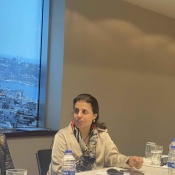Religion and Human Rights in the Palestinian Draft Constitution: Lessons Learnt from Emerging Democracies in Arab Countries
In cooperation with the NGO Development Centre (NDC), the Institute of Law (IoL) at Birzeit University (BZU)organised on Thursday, December 20, 2012, a symposium on Religion and Human Rights in the Palestinian Draft Constitution: Lessons Learnt from Emerging Democracies in Arab Countries.
In her opening remarks, Dr. Samia Huleileh, BZU Vice-President for Community Outreach, stated that the “IoL is organising this seminar at the right time to elaborate on a major theme that is currently debated in the context of constitution development – the status of religion within national identity in line with legislation principles and terms of reference.” Current developments in the Arab Spring countries have given rise to thorny questions. Hulileh stated that “Over the past months, our researchers have examined this topic with a view to benefit from experiences of neighbouring Arab countries. In this seminar, we would like to contribute to the debate over the best formulas and potential options that befit Palestine in the area of national identity and sources of legislation.”
Jamileh Sahliyyeh, NDC representative, commended the cooperation between the NDC and Birzeit University, stating that this seminar “is one in a series of activities that conclude the Religion and Human Rights in the Draft Palestinian Constitution project. This avant garde initiative has been implemented by the IoL with support from NDC’s Grants component of the Human Rights and Good Governance Secretariat.”
Jamil Salem, IoL Director, explained that components of the seminar “are designed in light of IoL’s mission and approach towards promoting academic thinking and critical analysis. In addition to adopting new trends in socio-legal studies, the seminar is a step forward to promoting interdisciplinary research on current developments and transformations across the globe. “We hope that these disciplines give rise to a new set of approaches in law as well as allow a departure from the closed world that characterises the legal thought and education,” Salem concluded. nbsp;
The seminar comprised three sessions. Moderated by Dr. Islah Jad, Director of the Institute of Women’s Studies at BZU, the first session was entitled Religion and the State: Past and Present. Discussants analysed forms, patterns and tools of integrating religion within the state affairs, particularly through the constitutional text. They also assessed how deep religion would penetrate through the state functions. In addition to uncovering “hues of secularism,” participants traced down major phases of the relationship between religion and the state in the world in general, and in the Arab region in specific. Narmin Siyam, IoL researcher, made a presentation on How Do States Usually Deal with Religion in the Constitution? Dr. Magid Shihade, Professor of International Studies at BZU, presented a paper on Rediscovering Religion and Secularism. In his presentation, Dr. Ali al- Sartawi, Professor of Law at An Najah National University, provided an assessment of the Religious Position towards the Constitution of the Civil State. In conclusion, Dr. George Giacaman, Professor of Cultural Studies at BZU, provided commentary on presentations delivered in the first seminar session.
In the second session on Experience of Arab Neighbors, presentations reviewed the current debate in several neighbouring countries, with a particular focus on Egypt and Tunisia. Discussants provided a comparison of pre- and post-revolution constitutional mobility regarding religion and state issues. They also addressed results and consequences of various approaches to deconstructing religion and human rights issues in the constitution. The session included talks by Dr. Ali Khashan, former Minister of Justice, on Religion in the Constitution in the Arab Spring Countries; Mohammed Khader, IoL researcher, on Problems of Integrating Religion within the Constitution: A Comparative Approach; nbsp;and Bastien Ebalard, IoL research assistant, on Problems of Integrating Religion within the Constitution: The Tunisian Experience. Randa Siniora, Executive Director of the Palestinian Independent Commission for Human Rights, moderated the session, and Dr. Mudar Kassis, Professor of Democracy and Human Rights at BZU, provided commentary on papers presented in the second session.
Moderated by Dr. Mustafa Mar’i, Professor of Law and Manager of the Religion and Human Rights in the Draft Palestinian Constitution project, the third seminar session on The Palestinian Experience was tailored to understand the Palestinian constitutional experience since establishment of the Palestinian National Authority, assessing whether Palestinians should reconsider how to address issues in question in light of changes the region has been witnessing since early 2011. Jamal al Khatib, Assistant to Secretary General of the Palestinian Legislative Council for Legal Affairs, made a presentation on How the Issue of Religion Has Been Dealt with in the Palestinian Experience. nbsp;Advocate Emilio Daoud, a specialist in constitutional issues, presented a paper entitled How the Issue of Religion Has Been Dealt with in the Basic Law. Reem al Butmeh, IoL researcher, overviewed Entry-points to Addressing Issues of Human Rights and Religion within the Constitution. Dr. Asem Khalil, Dean of the Faculty of Law and Public Administration at BZU, commented on papers presented in this session.
Towards the end of the seminar, Dr. Basem az Zubeidi, Professor of Political Science at BZU, summed up conclusions and made a briefing note on issues that need further research.






